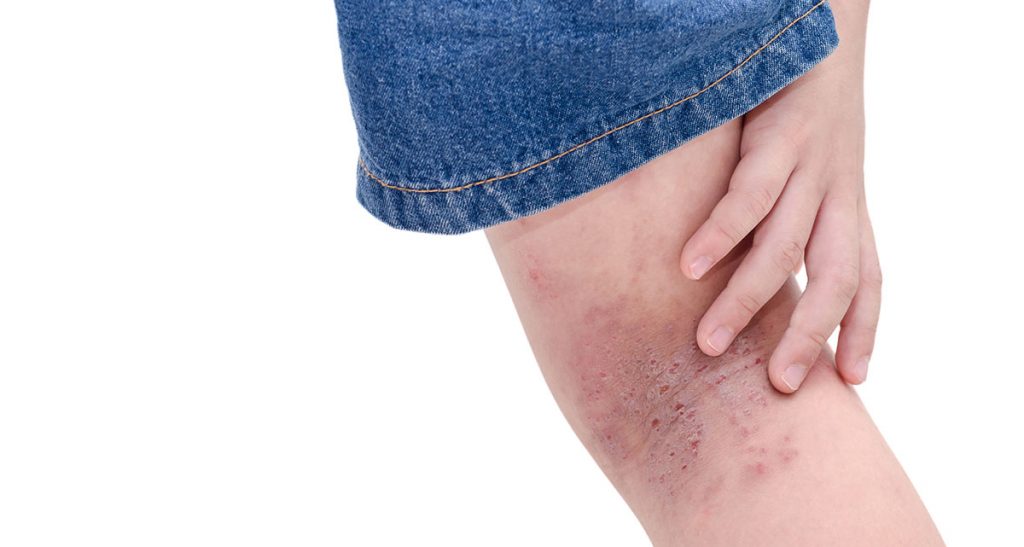By Sherrie Miller
Eczema, or Atopic Dermatitis, is a common chronic skin condition amongst children. In fact, it affects approximately 20% of children and the numbers continue to rise.
Eczema is generally characterised by itchy, red, inflamed skin. It can present itself as a patchy raised red rash, and in some cases, splitting and weeping skin. Eczema is often seen on the face, backs of the knees, hands or the folds of the skin. In many cases, children who have eczema are more likely to have asthma and other allergies. Eczema flare-ups often happen in winter due to the dry, cold air and indoor heating systems that can dry out the skin.
Popular treatments of eczema are usually topical with cortisone creams, or by taking antihistamines, oral steroids or immune-suppressant medications. Bleach baths are also often recommended. The types of clothing a child may wear, temperature fluctuations, and what detergent clothes are washed in, may also cause eczema flare-ups.
Eczema is considered a systemic condition and so treatment should be looked at from a systemic viewpoint. Serum IgE (Immunoglobulin E) antibodies are usually high in many eczema cases which suggests the immune system is reacting to substances within the body.
We know that skin barrier dysfunction is the main concern for eczema sufferers, often looking at environmental factors but other areas to investigate include stress, food intolerances, digestive issues, gut dysfunction and nutritional deficiencies.
Food Intolerances
Food intolerances can include common allergens such as gluten, dairy and eggs. However, naturally occurring food compounds such as salicylates, amines and glutamates can also be triggers. Writing a food diary and monitoring flare-ups may assist in finding the potential cause of eczema.
Undergoing an elimination challenge test is another way to determine potential eczema triggers. Start with the elimination of suspected food allergens. Do this for 2-4 weeks to see if eczema symptoms clear up. If this elimination shows improvement in the skins condition then do a challenge test by adding the food back into the diet, one at a time, and monitor any reactions. If a reaction should occur, this could indicate which food may be an eczema trigger.
If you are a breastfeeding mum with a baby suffering with eczema, then you should also do an elimination challenge test with your own diet. Food intolerances can come through a mother’s breast milk and affect the child’s skin condition.
It’s best to be guided by a nutritional health care professional when doing a diet elimination challenge test.
Artificial Additives
Artificial additives such as colours, flavours and preservatives are common eczema triggers. Avoiding these additives for general good health is recommended whether eczema is a problem or not. Read food labels to determine triggers. MSG and other flavour enhancers should also be avoided.
You can download a phone app to research artificial additives in foods by simply entering the number code you see in the ingredients list and the app will provide you information on the potential harm.
Digestive Issues
Gut health is an area of medical research that is gaining huge momentum and there is so much more yet to discover in this interesting area of medicine. When we talk of the gut, we are referring to the gastrointestinal (GI) tract. The GI tract consists of the mouth, oesophagus, stomach, large intestine, small intestine and anus. The liver, pancreas and gall bladder are the other organs that make up part of the whole digestive system. Residing within the gastrointestinal tract is an army of bacteria and pathogens collectively known as the microbiome which play an influential part in many biochemical functions within the body.
Digestive issues can include constipation, diarrhoea, bloating and reflux. More chronic complex cases include Irritable Bowel Syndrome, Crohn’s Disease and Diverticulitis.
Healthy digestion is important to extract the nutrients from the food we eat to allow our body to function optimally. This process of digestion also includes eliminating wastes from our body. When our diet is unhealthy or digestion is not functioning properly, this can cause inflammatory conditions. If the inflammation becomes chronic, it may cause intestinal permeability, commonly referred to as leaky gut. When leaky gut occurs, unwanted pathogens, food particles, proteins and toxins may leak into the blood stream, striking an immune response. This immune response can irritate and inflame different parts of the body, which may include the skin. Addressing digestive issues is a key component in managing eczema.
Probiotics
Research is showing positive outcomes with the use of specific strains of probiotics for eczema treatment with Lactobacillus rhamnosus, Bifidobacterium lactis and Lactobacillus acidophilus indicating the best results. Mothers taking probiotics from two months before delivery and during the first two months of breast feeding also showed reduction in eczema development for high-risk infants. More research is to be done, but for now it appears that high doses of Lactobacillus rhamnosus, Bifidobacterium lactis and Lactobacillus acidophilus probiotics in single or multi-strain formulations currently hold the most promise for prevention and treatment of eczema in children.
Skin Nutrients
There are many powerhouse micro and macro nutrients that are crucial for healthy skin.
Vitamin A plays an important role in skin repair and reducing inflammation. Not getting enough Vitamin A in the diet has been shown to contribute to inflammatory skin conditions such as eczema.
Vitamin E is an antioxidant that helps protect skin from free radical damage improving skin barrier function. Vitamin E can be used through diet and topically to assist in the healing and prevention of eczema.
Vitamin D deficiency may be a contributor to eczema. Vitamin D is required for skin synthesis, metabolism and activity. It regulates many physiological processes in the skin ranging from cellular proliferation to barrier maintenance and immune function.
Zinc is an important nutrient for immunity, helping the body fight infection. Zinc also assists in skin cell growth and healing wounds.
Omega 3 fatty acids are anti-inflammatory assisting the body in reducing inflammatory proteins and immunoglobulin E (IgE). Omega 3’s may also improve skin barrier function, seal in moisture and keep out irritants.
Quercetin is a bioflavonoid found in certain fruits and vegetables as well as green tea. It has both antioxidant and antihistamine properties. Quercetin inhibits the secretion of histamine and inflammatory markers and with this has been shown to decrease eczema symptoms.
Healthy skin is an inside job. It’s not a one size fits all approach but definitely worth exploring. Seek a nutritional health professional to address these underlying issues in treating eczema.
Sherrie Miller is a qualified nutritionist with a special interest in nutritional skin care. Skin disorders such as eczema, acne or excessively dry skin are usually indicative of something else going on deep within. Following a plan that addresses gut health issues, liver function and nutritional deficiencies may bring some relief to those challenging skin disorders.

